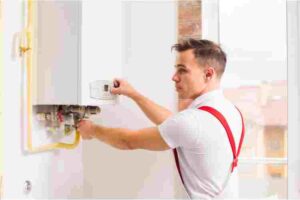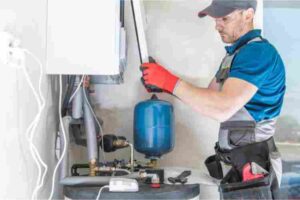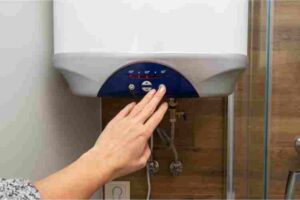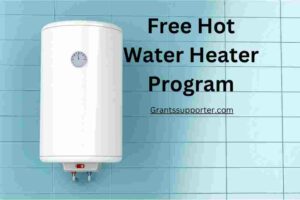Wondering how to manage this winter without a reliable water heater? This article is your savior. It’s specially designed to help low-income families learn about free water heater programs. You’ll discover various free hot water heater programs offering this essential service, understand their eligibility criteria, and learn how to apply. Let’s delve into this warm world of assistance and ease your winter worries!
Top Free Hot Water Heater Programs
Navigating winter without a reliable water heater is challenging, especially for low-income families.
This guide introduces top free hot water heater programs, including Section 504 Home Repair, LIURP, and others.
These initiatives focus on energy efficiency and offer assistance like grants and counseling, providing vital support for families in need.
Understanding eligibility criteria and following the application guide empowers households to access these programs, ensuring a warmer and more energy-efficient home during the winter months.
1. Section 504 Home Repair Program
Administered by the U.S. Department of Agriculture, this free hot water heater program helps low-income homeowners in rural areas.

It provides grants and loans for home repairs and improvements, including replacing or repairing free water heaters for low income.
The grants are particularly aimed at elderly homeowners to remove health and safety hazards from their homes.
2. The Low-Income Usage Reduction Program (LIURP)
LIURP focuses on reducing the energy bills of low-income families by improving the energy efficiency of their homes.
This can include replacing old, inefficient free water heaters for low income. with new, energy-saving models, as well as other measures like insulation and weatherization.
3. The Home Energy Counseling and Checkup Program (HEC²)
This program offers personalized energy counseling and home energy checkups to help homeowners understand their energy usage and find ways to save, which may include upgrading to more efficient hot water heaters.
4. The Michigan Home Repair Assistance Program
Aimed at Michigan residents, this program assists with essential home repairs for safety and health.
It includes services like replacing malfunctioning or free water heaters, especially in homes where a lack of hot water poses a health risk.
5. The Colorado’s Affordable Residential Energy (CARE) Program
The CARE program in Colorado provides energy efficiency upgrades to low-income households.
It may include the installation of energy-efficient water heaters to help reduce overall energy consumption and costs.
6. Energy Savings Assistance :
This program, offered by various utility companies, provides free energy efficiency improvements to qualifying households.
Services can include the replacement of inefficient hot water heaters to help reduce energy usage and lower utility bills.
7. HE+ Program Services For Free Hot Water Heater Program
HE+ offers a range of energy-saving services, which can include upgrading to high-efficiency water heaters.

The free hot water heater program is designed to help reduce energy consumption and costs in households that meet specific income criteria.
8. HopeWorks Emergency Low-Income Program for Seniors (HELPS)
Specifically designed for senior citizens, HELPS provides emergency assistance, including potentially addressing urgent water heater issues, to ensure seniors live in safe and comfortable homes.
9. Low-Income Home Energy Assistance Program (LIHEAP)
LIHEAP helps low-income families with their energy bills and may offer assistance for repairing or replacing heating systems, including hot water heaters, particularly in situations where a lack of hot water affects the household’s health and safety.
10. Weatherization Assistance Program (WAP)
WAP helps low-income families by improving the energy efficiency of their homes. This can include replacing old, inefficient hot water heaters with new models to help reduce energy consumption and costs.
11. National Energy Assistance Referral Programs
These free hot water heater program provide referrals to local resources for energy assistance, including potential aid for water heater repairs or replacements, based on the specific needs and location of the applicant.
12. IRA Tax Credits
Homeowners can take advantage of tax credits under the Inflation Reduction Act for making energy-efficient home improvements, which might include the cost of installing energy-efficient free hot water heaters.
13. Inflation Reduction Act (IRA) For Free Hot Water Heater Program
The IRA includes several provisions for homeowners to make their homes more energy-efficient, potentially covering expenses for new, energy-efficient free hot water heater Program as part of a broader home energy upgrade.
Eligibility For Free Hot Water Heaters For Low-Income Families
To qualify for free water heaters tailored for low-income families, consider these common eligibility criteria:
- Income Level: Below a specified threshold.
- Participation: In assistance programs like LIHEAP.
- Proof of Need: Documentation of financial hardship.
- Residence Status: This applies to both homeowners and renters.
- Geographic Considerations: Specific regions or communities.
- Housing Type: Various programs for different housing types.
- Energy Usage: Consideration for higher consumption.
- Water Heater Condition: Prioritizing older or inefficient models.
- Family Size: Adjusted criteria for larger households.
- Priority Groups: Focus on seniors, individuals with disabilities, or families with young children.
- Compliance: Adherence to program guidelines and application procedures.
Applying For Free Water Heater Programs: A Step-by-Step Guide
Accessing free hot water heater programs can be a transformative step for low-income families. Here’s a step-by-step guide on how to apply:
Step 1: Research Local Programs:
Identify programs available in your area by contacting local utility companies, government agencies, and non-profit organizations. Online research and community centers can also provide valuable information.
Step 2: Check Eligibility Criteria:
Review the eligibility requirements for each program. Ensure that your household meets the income thresholds, residence status, and other specific criteria outlined by the program.
Step 3: Gather Necessary Documents:
Collect required documentation such as proof of income, residence status, and any additional paperwork specified by the program. Having these documents ready streamlines the application process.
Step 4: Contact Program Administrators:
Reach out to the administrators of the chosen program. This may involve contacting local utility offices, community action agencies, or the program’s designated point of contact. Inquire about application procedures and deadlines.
Step 5: Attend Information Sessions (If Required):
Some programs may conduct informational sessions to guide applicants through the process. Attend these sessions to gain insights into the program’s requirements and expectations.
Step 6: Complete Application Form:
Obtain and fill out the official application form provided by the program. Ensure accuracy and completeness, attaching all required documents.
Step 7: Submit Application:
Follow the submission instructions carefully. Applications are typically submitted either online, in person, or by mail. Confirm the submission method with program administrators.
Step 8: Wait For Processing:
After submitting your application, allow time for processing. Program administrators will review your application and documentation to determine eligibility.
Step 9: Assessment and Approval:
If approved, the program will schedule the installation of the free water heater. This may involve an assessment of your current water heater and the installation site.
Step 10: Installation:
Upon approval, a qualified technician will install the energy-efficient water heater in your home. Some programs may also provide information on proper usage and maintenance.
Step 11: Follow-Up and Compliance:
Adhere to any post-installation requirements outlined by the program. This may include periodic check-ins, feedback sessions, or compliance with energy-saving practices.
Step 12: Seek Additional Assistance (If Needed):
If you encounter challenges during the process, don’t hesitate to seek assistance from program administrators or community support services.

By following these steps, you can navigate the application process for free water heater assistance programs and potentially benefit from energy-efficient upgrades, reducing both utility costs and environmental impact.
Conclusion
In conclusion, this guide is a vital resource for low-income families navigating winter without a reliable free hot water heater. With insights into diverse free hot water heater programs for low-income families, eligibility criteria, and a practical application guide, the article empowers families to access crucial resources for a safer and more energy-efficient home.
